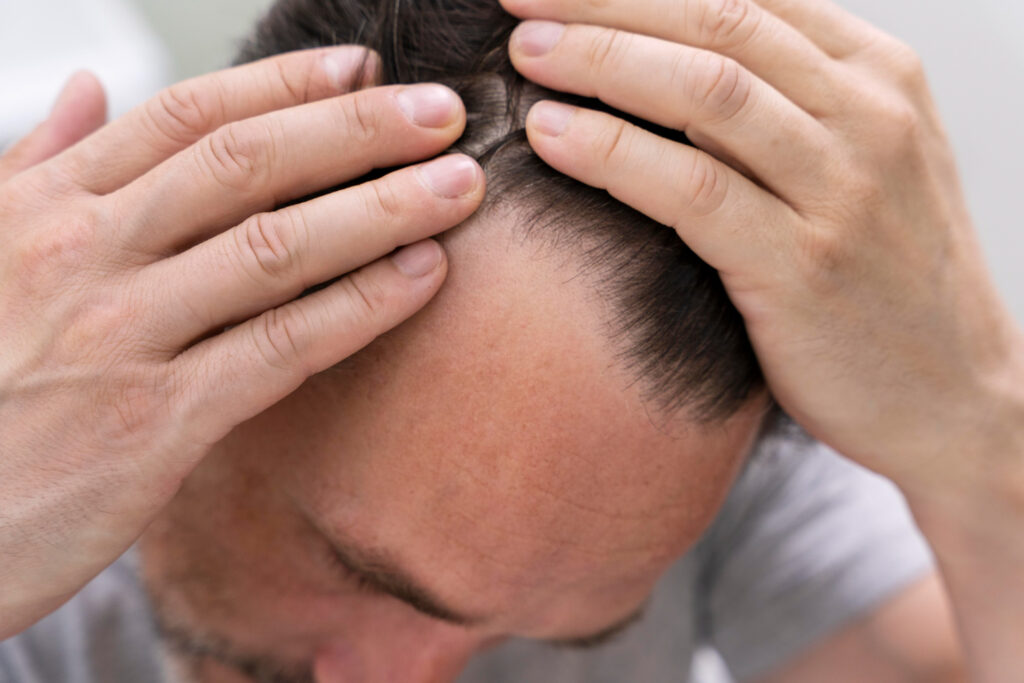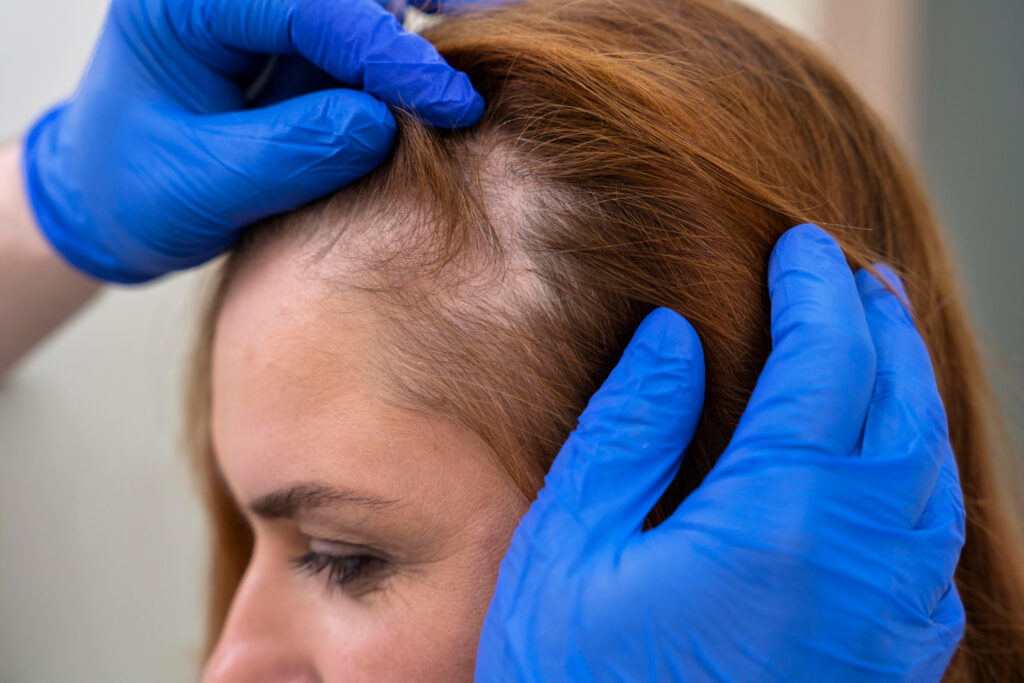You’ve swapped your harsh shampoo for a sulfate-free option. You’re taking your vitamins religiously. You’ve even invested in that fancy scalp massager everyone’s raving about on social media. Yet every morning, you still find hair scattered across your pillow and clogging your shower drain. What gives?
The Hidden Culprits Behind Stubborn Hair Loss
Stress: The Silent Hair Thief
We all know stress isn’t great for our overall well-being, but did you know it’s one of the biggest saboteurs of healthy hair? When your body experiences chronic stress, it can push hair follicles into what scientists call the “telogen” (resting) phase prematurely. The result? More hairs falling out than normal.
“Many people don’t connect their hair loss to a stressful event that happened three to six months earlier,” explains Dr. Sarah Chen, a board-certified dermatologist based in Boston. “There’s often a significant delay between the stressor and when you notice increased shedding.”
What’s particularly tricky is that stress creates a vicious cycle. You stress about your hair loss, which causes… more hair loss. Breaking this cycle might require addressing both the external stressors in your life and changing how you respond to them internally.
Hormonal Imbalances Beyond the Obvious
While most people have heard that hormones like DHT (dihydrotestosterone) play a role in male pattern baldness, hormonal influences on hair health are far more complex—and affect women just as significantly as men.
Thyroid imbalances, insulin resistance, and fluctuations in estrogen and progesterone can all contribute to hair thinning, even when you’re doing everything else “right.” What’s more, these imbalances don’t always show up clearly on standard blood tests, especially if they’re mild or intermittent.
Jessica Thompson, 34, experienced significant hair shedding for years before discovering her subclinical hypothyroidism was to blame. “My thyroid numbers were technically within the ‘normal’ range, but at the very bottom of that range. Once I worked with a healthcare provider who understood that ‘normal’ doesn’t mean ‘optimal’ for everyone, I finally started seeing improvement.”
Nutritional Gaps Even With a “Perfect” Diet
You’ve cut out junk food. You’re eating plenty of protein. You’ve even added foods rich in biotin and other hair-friendly nutrients. So why isn’t your hair getting the memo?
The answer might lie in absorption rather than intake. Digestive issues like low stomach acid, intestinal inflammation, or an imbalanced gut microbiome can prevent your body from properly utilizing the nutrients you’re consuming.
Even more confounding: some nutrients compete for absorption. For example, zinc and iron—both crucial for hair health—can interfere with each other’s absorption when taken together in supplement form.
“I recommend spreading out certain supplements throughout the day,” advises registered dietitian Maya Feller. “And more importantly, working to address any underlying digestive health issues that might be preventing proper nutrient absorption in the first place.”
Sleep Quality: The Underrated Hair Growth Factor
Getting eight hours doesn’t necessarily mean you’re getting quality sleep. Sleep apnea, frequent waking, or not spending enough time in deep sleep stages can all impact your body’s ability to repair and regenerate—including your hair follicles.
Research suggests that during deep sleep phases, growth hormones essential for tissue repair, including scalp tissue, are released in greater amounts. Without sufficient deep sleep, these restorative processes may be compromised.
Consider tracking your sleep cycles with a wearable device or app to gain insights into your sleep architecture. Addressing issues like poor sleep hygiene, inconsistent sleep schedules, or potential sleep disorders could pay dividends for your hair health.
Environmental Aggressors You Might Be Missing
While you’ve ditched the harsh hair products, other environmental factors might still be damaging your strands and scalp.
Hard water, with its high mineral content, can leave buildup on hair and scalp that blocks healthy growth. Chlorine from swimming pools can weaken hair structure. And pollution—particularly in urban environments—deposits free radicals onto the scalp that can damage follicles over time.
“Installing a shower filter was a game-changer for me,” shares Michael Roberts, who struggled with thinning hair despite an impeccable hair care routine. “Within two months of filtering out the chlorine and minerals in my water, I noticed significantly less shedding and more baby hairs growing in.”
The Mind-Hair Connection: How Your Thoughts Affect Your Strands
Beyond these physical factors lies something even more profound: the psychological dimension of hair health.
Hair loss can trigger feelings of diminished self-worth, anxiety, and even depression. These emotional responses then create physiological changes—increased cortisol, inflammatory responses, and altered blood flow patterns—that can further compromise hair growth.
Breaking this cycle often requires addressing both the physical and psychological aspects simultaneously. Mindfulness practices, cognitive behavioral techniques, and sometimes professional counseling can help transform how you respond to hair concerns.
“I spent years obsessively checking my hairline in the mirror multiple times daily,” admits Carlos Diaz, who experienced progressive thinning in his late twenties. “My dermatologist actually prescribed not just treatments for my scalp, but also meditation and cognitive exercises to help me stop the constant checking and worrying. Surprisingly, addressing the psychological aspect helped almost as much as the treatments themselves.”
Personalized Approaches: Why One-Size-Fits-All Solutions Fall Short
Perhaps the most frustrating aspect of persistent hair loss is that what works brilliantly for someone else might do absolutely nothing for you. This isn’t just bad luck—it reflects the highly individualized nature of hair growth biology.
Genetic variations affect how your body processes nutrients, responds to stress, metabolizes hormones, and reacts to environmental factors. These variations help explain why your friend might see amazing results from a supplement that leaves you with nothing but disappointment.
“The future of hair wellness lies in personalized approaches,” explains trichologist Jennifer Wilson. “We’re beginning to understand how factors like genetic polymorphisms, microbiome composition, and even chronobiology affect individual responses to various interventions. The cookie-cutter approach is becoming increasingly outdated.”
While personalized medicine is still evolving, working with knowledgeable healthcare providers who take a holistic, individualized approach to hair concerns—rather than prescribing the same protocol to everyone—can help you identify your unique hair loss triggers and solutions.
Moving Forward: A More Comprehensive Approach
If you’ve been diligently following conventional hair care advice without seeing results, consider expanding your approach:
- Look deeper at potential health contributors: Consider comprehensive hormone panels, nutrient testing beyond basic bloodwork, and evaluations for inflammatory conditions or autoimmune factors.
- Address the whole system, not just the symptom: Hair health reflects overall body health. Improving sleep quality, managing stress, optimizing digestion, and reducing toxic burden can create the internal environment where healthy hair becomes possible.
- Consider chronology: Track hair shedding against your life events, diet changes, new medications, or environmental changes from 3-6 months prior, when the actual damage to the hair follicle likely occurred.
- Be patient but persistent: Hair growth cycles operate on months-long timelines. Give new approaches at least 3-4 months before determining effectiveness.
- Seek emotional support: Hair concerns take a psychological toll. Connect with support groups, online communities, or mental health professionals who understand the emotional impact of hair changes.
Remember that healthy hair grows from healthy bodies and minds. Addressing underlying imbalances—rather than just applying topical treatments—often holds the key to resolving persistent hair concerns.
When to Seek Professional Help
While many lifestyle factors affecting hair health can be self-managed, certain situations warrant professional evaluation:
- Sudden or patchy hair loss
- Hair loss accompanied by scalp pain, itching, or visible changes
- Hair thinning alongside other concerning symptoms like extreme fatigue, weight changes, or digestive issues
- Hair loss that significantly impacts your quality of life or emotional wellbeing
Dermatologists, trichologists (hair specialists), endocrinologists, and functional medicine practitioners can offer specialized testing and personalized guidance for complex hair concerns.

Disclaimer: This article is for informational purposes only and does not constitute medical advice. The information provided here is not intended to diagnose, treat, cure, or prevent any condition. Always consult with qualified healthcare professionals before making changes to your health regimen, especially if you have underlying medical conditions or take prescription medications.



